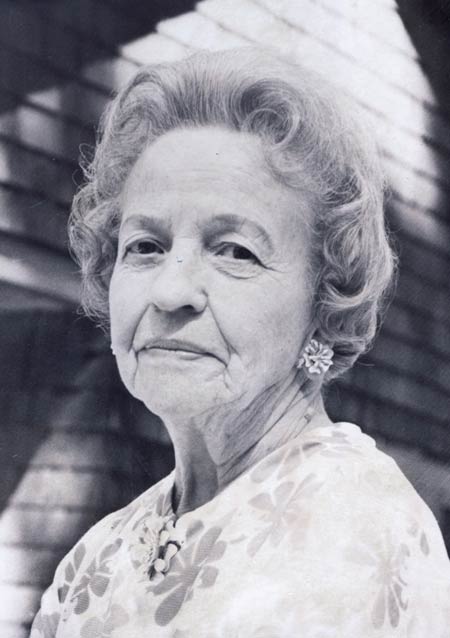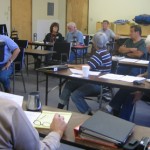
Editor’s note: This feature ran in the Town Crier on Nov. 4, 1976. Gladys Humphreys died in January 1979 at age 83.
“We used to have a view of Lily Rock and Marion Mountain, but the trees grew faster than this house,” laughed Gladys Humphreys, cozy in the modest home that she and her late husband, Fred, built on Wildwood Drive in 1929.
Gladys and Fred came to Idyllwild frequently, starting in 1924, while Fred was working in Hemet in charge of the county road district. They would picnic beside Strawberry Creek, which Gladys remembers as a swift torrent in those days. One time they followed a dirt logging road up from where Village Center bridge now is, and found the perfect homesite beside a seasonal stream. There they built their home, and the four of them — Gladys, Fred, and daughters Mary Jane and Katharine — became Idyllwilders.
In those days, Idyllwild was mainly a summer resort. An outdoor summer school, Gladys recalls, was held alongside the creek below Village Center bridge. And there were nightly campfire programs in front of the Inn, with religious services on Sunday. Following the campfires there was free dancing for Inn guests and homeowners, with live music. Gladys remembers that a group of young men, who worked during the day (probably at the Inn), formed an orchestra for the dancing. And the campfires often included special programs such as costume parties.
And there were summer tennis tournaments on the courts at North Circle and Cedar, held for 10 days or two weeks each summer. Players came from near and far.
One summer, Gladys recalls, “A man decided that what Idyllwild needed was an outdoor movie. So he set up one. But in those days, when we had showers every day in summer, it was just too cold to sit through a movie. All of the homeowners tried to support it; we wore ski clothes, and put Army blankets over the seats and around our legs. But he finally went broke and moved out.”
When Fern Valley was subdivided and a golf course and clubhouse built on the present Desert Sun School [now AstroCamp] location, all who purchased lots automatically acquired membership in the country club. Gladys recalls that the golf course was used mostly by men over the weekend, while wives enjoyed bridge luncheons and children played in a small pool. “During the week,” she adds, “some of the women would try to play golf with their husbands, who became very efficient in popping the heads of the rattlesnakes in the meadow.” On weekend evenings there were often parties and dancing.
But it was winter that Gladys and Fred really enjoyed the most — and winters were more severe in those days, she is convinced. There was much more snow, then, Glady’s memory tells her, yet Fred managed to keep the community’s roads open all winter, using one blade mounted on one truck — the entire snow-clearing equipment.
“There were lots of parties in winter, and everybody was very friendly. We were very interdependent, and everybody helped each other in an emergency. A lot of this spirit still survives in Idyllwild, but it was more important then because there were so few of us here in the winter.”
But Idyllwild had to make do with far fewer amenities than are available today. The only phone in town for several years was a the Inn. (Fred and Gladys were given the first phone in a private home.) Charles Bosworth’s little rock Idyllwild Store (on the Carriage Inn parking lot) closed in winter, and residents had to drive over primitive roads to Hemet to stock up on supplies. And, in the early ’30s, when the Humphreys girls attended the Idyllwild school, there were only five other children enrolled. (Bill Jolley Jr., Jim Jolley and Gus Whisnard were among them.)
“There was an apartment for the teacher — Miss Adams — at the school. But the classroom was painted a dark color and was lighted by four bare bulbs, terrible on the eyes. It was heated at first by a wood stove, later by oil.”
Gladys became a member of the school board and did her best to improve things. “I got them to paint the room a light apricot color and to improve the lighting. And I got a linoleum floor installed.”
When the Humphreys girls graduated from elementary school, they boarded in Hemet during the winter in order to attend high school there. (The school district gave parents a $9-a-month boarding allowance.) But again Gladys fought the good fight, threatening that Idyllwild would secede from the Hemet district and join San Jacinto. Soon the Hemet district provided a school bus for Idyllwild children.
Early in the war, Fred left the Road Department to take over management of McCoy’s lumber yard in the village. And Gladys operated Gray’s Photo Shop for a year or so while Bob and Virginia were away. “But,” Gladys remembers, “materials for building became so scarce during the war that, when Fred was asked to go out to the Lend Lease Depot at Yermo as bookkeeper and supervisor, we moved out there till the war ended.”
“During that time we had bought a hunting and fishing resort in Utah. After the war was over we stayed on at the Depot when Mira Loma took over, until time to take over the resort when the weather made it possible to get to the lake — which was at 8,300-foot elevation.”
The Humphreys operated the resort during the summers until 1952, wintering in Idyllwild. Finally injuries from an automobile accident forced them to give up the hard work entailed.
Other wartime memories in Idyllwild:
“During the war there was a plane watch that was manned 24 hours a day, and those who served a certain number of hours got their ‘wings’. During the day, usually two were on duty — one to observe and one to phone in to the headquarters. Men took the night shifts. Also, a ski patrol was organized for searches during the winters.”
Fred Humphreys passed away in 1964, and Mary Jane the following year. [At the time of this story, Katharine lived in Whittier.] At first, Gladys withdrew from social activity and lived quietly with her sadness. But she is an intelligent woman who knew this only increased her grief. “So I became active again. I joined everything — the Women’s Guild, the Izaak Walton League, the 39ers, the Property Owners Association, the Garden Club and so on.” And today she is all over town, busy and involved. Still in love with Idyllwild, but fearful that high taxes and increasing age will someday force her to leave her little streamside cottage to move to the mobile home she maintains in the valley.
If that happens, she will take a lifetime of memories with her.










